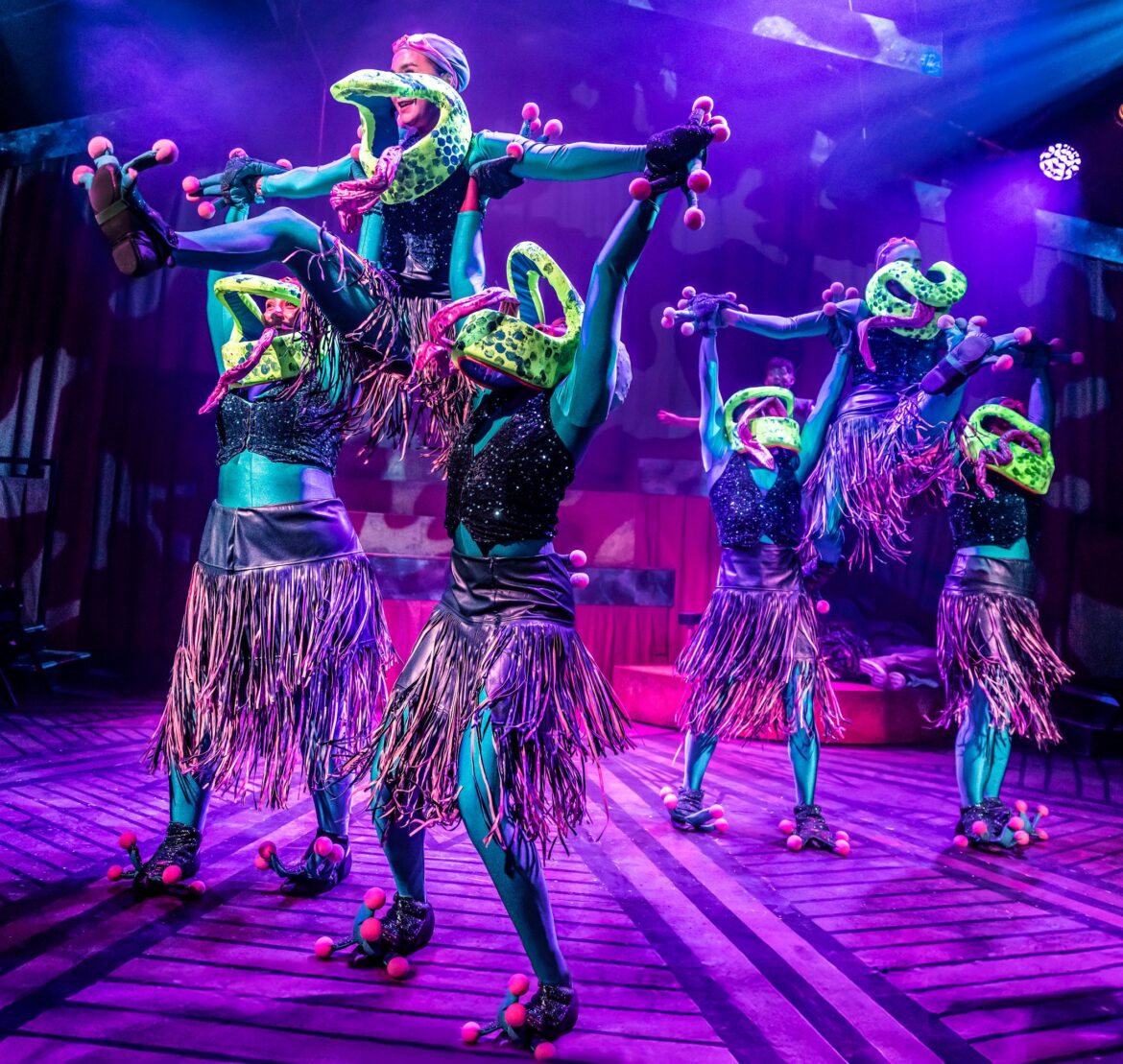Review by Simon Jenner, May 31 2025
That musicals powerhouse has struck gold this time. The Frogs opens at Southwark Playhouse Borough directed by Georgie Rankcom till June 21st. What the hell is it? Is the right question. “The time is now. The place is ancient Greece.” After a curious How to Succeed in Business in 2023, Rankcom returns in a blaze from below.

DAn Buckley, Kevin McHale. Photo Credit: Pamela Raith
Till 1974 Aristophanes’ The Frogs from 405 BCE hadn’t been much revived (only Lysistrata of his eleven surviving comedies ever is). Then Stephen Sondheim burst on the sleeping amphibians with a free adaptation by Burt Shevelove. It became one of those critical successes that never quite caught on. Then Nathan Lane in 2004 prodded Sondheim with a rewrite and new material. It’s had strong revivals. Most recently in the West End in 2017. So why see two-hours-twenty of it?
First it’s a superb revival: ideally clear, beautifully-sung by a ten-strong cast, with Matt Nicholson’s devilishly on-point choreography. Next the performers: Dan Buckley’s Dionysus, the hubris-lite demigod who’s decided to drag slave Xanthias (a mesmerically characterful Kevin McHale, masterfully laconic with pauses like eye-rolls) to hell with him: to drag out Bernard Shaw to restore order and teach the world sense, since no playwright above seems remotely capable of telling rulers what’s what (and ancient Greece they literally did, to their faces). After all Dionysus is god of drama as well as wine. Buckley’s vocals chisel through every syllable, outstanding even in this exceptional cast. And McHale undercuts to the human like a bass-note.
One the way Dionysus seeks advice from rippling half-brother Herakles (Joaquin Pedro Valdes), a strut of an act. And has to charm ferryman-of-the-dead Charon (a deliciously truculent Carl Patrick, who had that Shakespeare in the back of his boat… you know the kind) who can take payment on a card-reader. Yes a few updates since 2004. The cast bar Pluto but including Valdes multi-role as a six-pack in a dazzle of costumes (the major part of Libby Todd’s design).

Photo Credit: Pamela Raith
When the Dionysiac duo make Hades, they’re enfiladed with songs and song-makers. Here they’re introduced to the first Pluto (of four in this run; followed by Danielle Steers, Sooz Kempner, Jo Foster). This is Victoria Scone, who exudes a warmth and consolatory cheer, not what you expect from Pluto. Scone’s magnificent, plays the under-earth-mother with an enormous wink, but quite soberly too, with a smile for earth’s foibles. There’s no gallery-acting here (just as well in the Large). Martha Pothen’s Shaw hatted and bearded, cheers with a skirl for the audience and a scowl for the world. Alison Driver’s Ariadne is affecting in a brief role, and as Xianthus is slowly coming to the idea that Hades is heaven, ensemble cast Milo McCarthy and Evonnee Bently-Holder shine; and provide what might be politely known as love-interest. In Aristophanes, Xianthus fades out somewhat: here, everything is satisfyingly wrapped.
That leaves on star. The ‘Parabasis’ or ‘It’s only a play’ is followed by the crowning ‘Fear No More’ sung by Bart Lambert’s Shakespeare. Lambert, a seasoned Shakespearean (amongst other things), enthrals. He not only looks the part (the release of his shock-grey locks is a coup) but his voice rings like antique bronze brought to a warming fire. Using quotes and very little cod-bard, he references everything up to an including Shakespeare’s known last words from The Two Noble Kinsmen. Lambert’s also human, contained in the way Pothen’s Shaw is all braggadocio; but then like to brawl himself. In the tricksy, clever riff on that ancient contest bits of Shaw and Shakespeare badinage about like mud-flung pearls. It’s funny, still quite long, but that’s Aristophanes. His genuine classical comedies are by definition imperfect.
And that’s one reason we need the kind of dramatic poetry that insults rulers as they sit in the ampitheatre, accusing them of crimes. But then they had democracy of a kind back then. Free speech even. Indeed Aristophanes’ prologues are the dramatist’s current op-eds. Owen Jones in verse. We may never have had democracy, but we’ll miss it when it’s gone.
Beyond those costumes, Libby Todd’s simple set design is a thing of curtains and a reveal of platforms and hatches; with a detachable semi-circular set of steps turned into Charon’s boat. Much of the scenic heavy lifting is done by Samuel Biondolillo’s multi-spectrum lighting.
It’s an ideal revival in a smallish space, and a must-see bullseye: Aristophanes, Shakespeare, Shaw and Sondheim in one. A nutri-bullet for the soul, and a enormous yes to whatever noes surround us.
Musicians: Deputy Musical Director Ed Zanders, Hannah Fry (Woodwind), Dan Taylor (Trumpet), Pippa Mason (Cello).
Sound Design Joshua Robins, Orchestrations Tim Sutton, Casting Director Peter Nodan
Assistant Director Elliot Aitken, Associate Choreographer Fletcher Robinson, Associate Lighting Designer Ruth Harvey
ASM Evie Graham-Brown, Production Manager Adam Smith, Sage Manager Waverley Moran, Wigs Josh Baling, Sound No. 1 Samuel Barnes, Wardrobe Supervisor Luke Pisano, Press Kevin Wilson, HR Consultant Laura Loutit
Thomas Hopkins Productions, Nelson & Tao, Eric Kuhn For Folk Productions,
Associate Producers Ashwini Anburajan, Curate, Michael Patrick
Victoria Scone. Photo Credit: Pamela Raith



